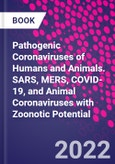Pathogenic Coronaviruses of Humans and Animals: SARS, MERS, COVID-19, and Animal Coronaviruses with Zoonotic Potential provides relevant information about common human coronaviruses that may mutate to increase their virulence. The addition of animal coronaviruses allows awareness of not only the potential of zoonotic transmission of coronaviruses from wild animals such as bats and rodents, but also from domestic agricultural and companion animals. The book opens with an introductory chapter on viruses, the immune system, coronaviruses, and their classifications, prevention and protection. Sections also cover history, disease, causative virus, immune response, diagnosis, treatment, prevention and surveillance.
The book's remaining chapters discuss coronaviruses with possible zoonotic transmission of domestic, semi-domestic animals and companion animals. It concludes with future perspectives of coronavirus mutations, modeling, protective measures and a discussion around pandemics and infectious diseases from around the globe.
Please Note: This is an On Demand product, delivery may take up to 11 working days after payment has been received.
Table of Contents
1. Introduction2. Severe Acute Respiratory Syndrome (SARS)
3. Middle East Respiratory Syndrome (MERS)
4. Coronavirus Disease-19 (COVID-19)
5. Coronaviruses of Wild/Semidomesticated Animals with the Potential for Zoonotic Transmission
6. Domestic Animal Coronaviruses with Possible Zoonotic Transmission
7. Pulling It All Together:� Where do we go from Here?
Appendix I Disease Overviews
Appendix II Glossary
Authors
Lisa A. Beltz University of Northern Iowa, USA. Lisa Beltz began her career in infectious disease research in the Department of Microbiology and Public Health at Michigan State University, with a dissertation entitled "Suppression of Human T Lymphocyte Responses by Trypanosoma cruzi.� She then spent seven years conducting research as a postdoctoral fellow at the Johns Hopkins University Hospital System and at the University of Pittsburgh. Her research during this period focused on how simian and human immunodeficiency viruses (SIV and HIV), respectively, interact with simian and human bone marrow and blood.Dr. Beltz then accepted a faculty position at the University of Northern Iowa, where she taught courses on biology while conducting research alongside the students she mentored. Dr. Beltz's research has investigated alterations in immune system function in response to exposure to green tea polyphenols, as well as the toxicological/immunotoxicological effects of environmental contaminants on human lymphocyte and monocyte viability and functioning. Afterward, she continued teaching while writing journal articles and books and giving conference presentations about infectious diseases of humans and bats. Dr. Beltz has previously written two books on this subject: Emerging Infectious Diseases: A Guide to Diseases, Causative Agents, and Surveillance and Bats and Human Health: Ebola, SARS, Rabies, and Beyond. She plans to continue writing about emerging and neglected diseases, particularly pathogenic coronaviruses that can infect humans.








